Orthodontic Appliances
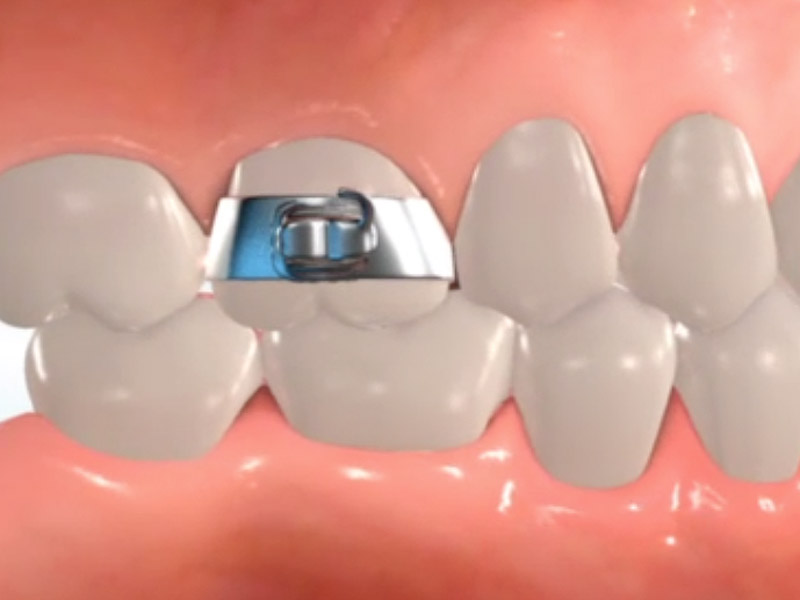
Bands
Bands are a ring of metal, which fit around the molars and sometimes premolars. The bands are selected from a range of sizes in order to find the tightest fitting band. The bands are sealed in position using dental cement that contains fluoride to prevent any decalcification during treatment.

Chain
A stretchable plastic chain used to hold archwires into brackets and to move teeth.

Elastics
Elastics or rubber bands for braces help move the upper and lower teeth relative to each other, ultimately achieving a better bite. The orthodontic rubber bands are typically effective for correcting overbites, underbites, or other types of alignments of the jaw. They are also useful for moving a tooth out of alignment or to close a space in the mouth.
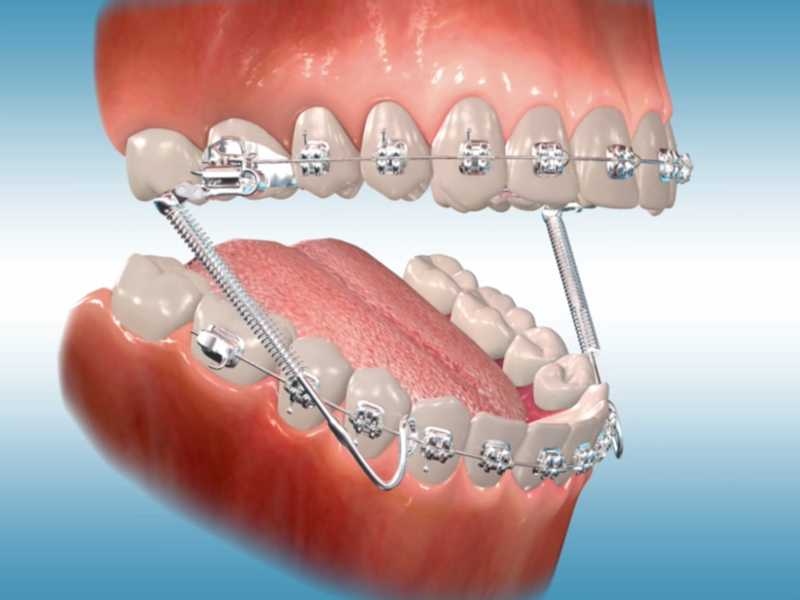
Forsus
A Forsus appliance is used in order to help move the upper molars back while moving the lower jaw forward, thereby correcting a Class II malocclusion also referred to as an overbite. Composed of a spring coil rod, the appliance is attached to the braces which decreases the need for patient cooperation. You may notice some discomfort initially, so we recommend a soft food diet for the first few days after the appliance is placed. Regular anti-inflammatory medication may help with any pain, if needed. It is important to keep the appliance clean; you may do this by carefully brushing the coil and other metal pieces of the appliance with your toothbrush. Also, we recommend that patients not open their mouths extremely wide, as the appliance may come apart. If the Forsus appliance becomes disengaged from the tube on the upper molar, the patient can usually reinsert it on their own.

Invisalign
Invisalign® is a series of clear, removable teeth aligners that orthodontists use as an alternative to traditional metal braces.
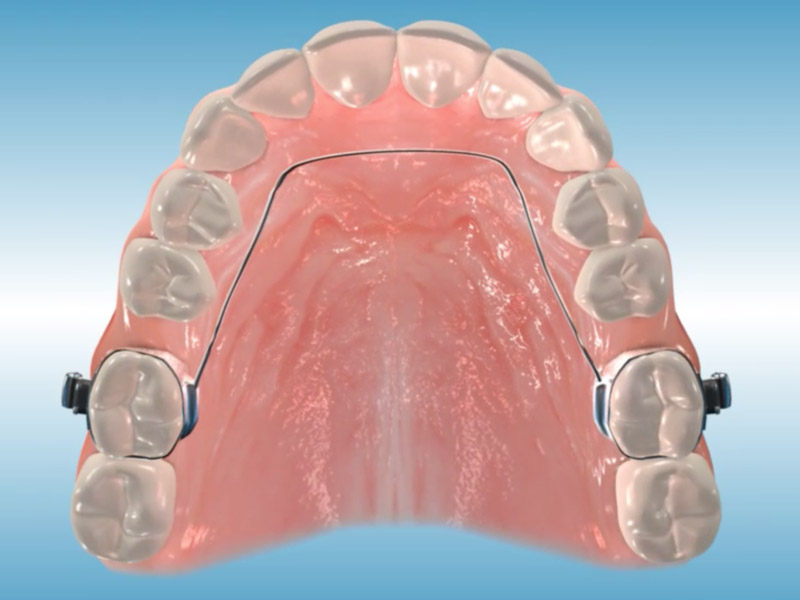
Lingual Arch
A lingual arch is an orthodontic device which connects two molars in the upper or lower dental arch.
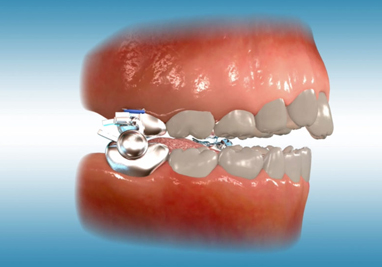
Mara
A Mara is a fixed appliance consisting of metal caps and small, hook-like devices. The hooks impact during the bite to drive the lower jaw forward retraining the bite and correcting a Class II problem.
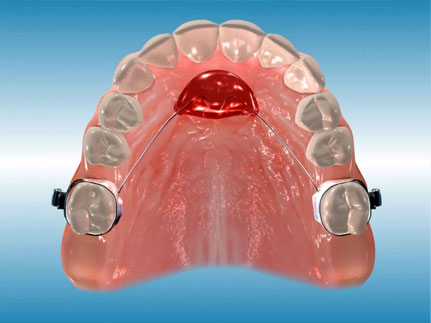
Nance
The Nance button is utilized to hold teeth in position to allow for the movement of other teeth. The impact of the button on the lower palate creates force on the back molars.

Palatal Expander
A palatal expander, also known as a rapid palatal expander, rapid maxillary expansion appliance, palate expander or orthodontic expander, is used to widen the upper jaw so that the bottom and upper teeth will fit together better.
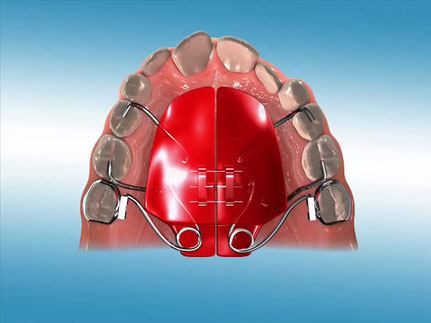
Pendex
This appliance is made of acrylic and wires. It sits on the top of your mouth. It is attached by wires that are bonded to your first premolars and by wire arms that insert into upper first molar bands that have been cemented to your teeth. The purpose of the Pendex appliance is to push your first molars back, creating space in the upper.
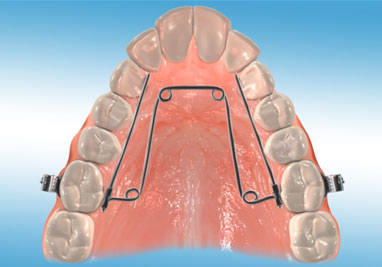
Quad Helix
The Quad Helix is checked and expanded approximately once every six to eight weeks. After the expansion is complete, the Quad Helix will remain in the mouth until the expansion is stable. Patients may feel mild discomfort for a couple of days. The tongue and cheeks have to make adjustments to the new appliance. Speaking and eating will require patience and time getting used to your appliance. Avoid hard foods and sticky foods. You will be able to clean your teeth and Quad Helix with your regular toothbrush.

Separators
Separators are tiny rubber bands or springs that your orthodontist places between your back teeth. These separators prepare your mouth for braces by creating a small gap between these teeth. This space allows for the placement of a metal band around your molar, which anchors your braces in your mouth.
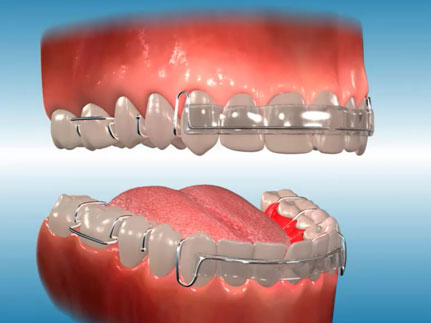
Spring Aligners
An appliance that can be used on both arches for minor rotation and correction of anterior alignment.
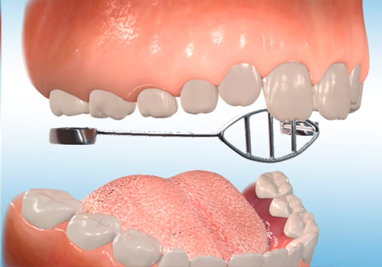
Thumb Crib
This simple device is given to address severe thumb/finger sucking habit. It involves using a fixed wire crib attached to two back braces.
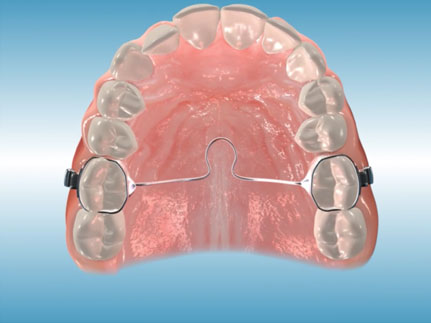
Transpalatal Bar
The Transpalatal Bar (TPA) is a fixed appliance that is attached to bands on the upper molar teeth. The bar that sits across the roof of the palate fits into a soldered clip located on the bands.
Bands

Bands are a ring of metal, which fit around the molars and sometimes premolars. The bands are selected from a range of sizes in order to find the tightest fitting band. The bands are sealed in position using dental cement that contains fluoride to prevent any decalcification during treatment.
Chain

A stretchable plastic chain used to hold archwires into brackets and to move teeth.
Elastics

Elastics or rubber bands for braces help move the upper and lower teeth relative to each other, ultimately achieving a better bite. The orthodontic rubber bands are typically effective for correcting overbites, underbites, or other types of alignments of the jaw. They are also useful for moving a tooth out of alignment or to close a space in the mouth.
Forsus

A Forsus appliance is used in order to help move the upper molars back while moving the lower jaw forward, thereby correcting a Class II malocclusion also referred to as an overbite. Composed of a spring coil rod, the appliance is attached to the braces which decreases the need for patient cooperation. You may notice some discomfort initially, so we recommend a soft food diet for the first few days after the appliance is placed. Regular anti-inflammatory medication may help with any pain, if needed. It is important to keep the appliance clean; you may do this by carefully brushing the coil and other metal pieces of the appliance with your toothbrush. Also, we recommend that patients not open their mouths extremely wide, as the appliance may come apart. If the Forsus appliance becomes disengaged from the tube on the upper molar, the patient can usually reinsert it on their own.
Invisalign

Invisalign® is a series of clear, removable teeth aligners that orthodontists use as an alternative to traditional metal braces.
Lingual Arch

A lingual arch is an orthodontic device which connects two molars in the upper or lower dental arch.
Mara

A Mara is a fixed appliance consisting of metal caps and small, hook-like devices. The hooks impact during the bite to drive the lower jaw forward retraining the bite and correcting a Class II problem.
Nance

The Nance button is utilized to hold teeth in position to allow for the movement of other teeth. The impact of the button on the lower palate creates force on the back molars.
Palatal Expander

A palatal expander, also known as a rapid palatal expander, rapid maxillary expansion appliance, palate expander or orthodontic expander, is used to widen the upper jaw so that the bottom and upper teeth will fit together better.
Pendex

This appliance is made of acrylic and wires. It sits on the top of your mouth. It is attached by wires that are bonded to your first premolars and by wire arms that insert into upper first molar bands that have been cemented to your teeth. The purpose of the Pendex appliance is to push your first molars back, creating space in the upper.
Quad Helix

The Quad Helix is checked and expanded approximately once every six to eight weeks. After the expansion is complete, the Quad Helix will remain in the mouth until the expansion is stable. Patients may feel mild discomfort for a couple of days. The tongue and cheeks have to make adjustments to the new appliance. Speaking and eating will require patience and time getting used to your appliance. Avoid hard foods and sticky foods. You will be able to clean your teeth and Quad Helix with your regular toothbrush.
Separators

Separators are tiny rubber bands or springs that your orthodontist places between your back teeth. These separators prepare your mouth for braces by creating a small gap between these teeth. This space allows for the placement of a metal band around your molar, which anchors your braces in your mouth.
Spring Aligners

An appliance that can be used on both arches for minor rotation and correction of anterior alignment.
Thumb Crib

This simple device is given to address severe thumb/finger sucking habit. It involves using a fixed wire crib attached to two back braces.
Transpalatal Bar

The Transpalatal Bar (TPA) is a fixed appliance that is attached to bands on the upper molar teeth. The bar that sits across the roof of the palate fits into a soldered clip located on the bands.


















